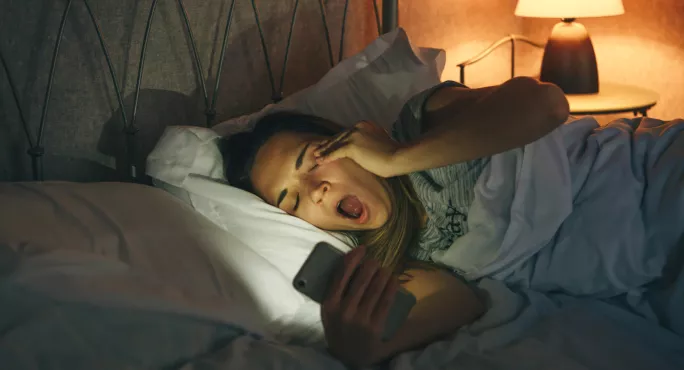How to help teens with sleep and social media use

It’s World Sleep Day, and an opportune time to look at how social media has changed the way teenagers sleep.
With 24/7 access to online interactions, the desire to engage with friends competes with the need to get enough sleep for good physical health, mental health and academic performance.
Hardly a day goes by without scary (often unfounded) headlines about the harmful effects of social media and screens. These fuel a worrying and often unhelpful perception of social media as a threat, with talk of “addiction”, despite a lack of evidence for using such strong terms.
Since 2014, the #sleepyteens research project at the University of Glasgow has been dedicated to looking beyond these headlines to present evidence on teenage social media and sleep.
Teens tell us that they want to stay connected to friends, even late at night, to avoid feeling left out the next day at school. They can also feel a sense of obligation to continue conversations past their intended bedtime to avoid offending friends by ending conversations.
Speaking to our research partner schools, it is clear that teachers want to discuss this with their pupils, but are faced with a lack of evidence-based materials and a plethora of fearmongering headlines. We therefore set out to support schools to promote balanced social media habits for healthy sleep.
A teacher’s view: ‘Teenagers need sleep - so let’s change the school day’
Long read: We need to wake up to teenage sleep problems
Covid: ‘Our students aren’t lazy - they just need more sleep’
Research: More than a quarter of pupils not getting enough sleep
Tired students: ‘We need to teach pupils the importance of sleep’
How to fall asleep at night: 3 tips for teachers
Previous attempts to improve adolescent sleep through schools have found that teenagers’ knowledge about sleep improves but their behaviours don’t change.
One important reason for this is motivation: the teenage brain is wired to value peer acceptance and approval, and the risk of being left out is weighed more heavily than other risks, like insufficient sleep.
So a promising approach is to open a dialogue to challenge underlying concerns about disconnecting from social media at night. Teachers in our research partner schools report feeling out of touch, struggling to keep up to date with the latest platforms and trends, so it is important to bridge the generational gap and help teachers and teenagers speak the same language.
The benefits and costs of adolescents using smartphones round bedtime has been an area of focus for much of the research by our #sleepyteens lab - @hollyscott248, @StephanyBiello and @clelandwoods. Those interested in their work should definitely check out this session. https://t.co/AjibmO5dpU
- UofG INP & Psychology (@UofGPsychology) March 16, 2021
Young people voice the need for relevant materials, so we developed curriculum materials based on customised statistics specific to that school.
This empowered teachers with current knowledge of their pupils’ habits, and provided a relatable evidence base for pupil-led discussions about how much sleep they got, whether they wanted more (typically, yes they did), and how social media could interfere with their planned bedtime.
Together, pupils and teachers collaboratively created tips for balancing social media and sleep, which pupils took home to discuss with their families.
Participating pupils praised the opportunity to discuss their statistics about sleep and social media habits, as this allowed them to “see what was normal for other classmates” and “it got everyone thinking about themselves and talking about their own experiences”.
Seeing statistics allowed pupils to feel that they were “not the only one” who worries about staying connected and being a good friend online.
This feedback highlighted a shift in dynamic away from adults lecturing using generalised information, towards young people taking ownership through research to lead discussions and challenge unhelpful preconceptions. This approach promotes autonomy and recognises that teens themselves are the experts in what it is like to balance the competing demands of socialising and sleep as a young person today.
Dr Heather Cleland Woods and Dr Holly Scott are lecturers at the University of Glasgow’s school of psychology.
For more information on #sleepyteens research and materials, contact Holly.Scott@glasgow.ac.uk and Heather.Woods@glasgow.ac.uk, or find them on Twitter @hollyscott248 and @clelandwoods
Register with Tes and you can read two free articles every month plus you'll have access to our range of award-winning newsletters.
Keep reading with our special offer!
You’ve reached your limit of free articles this month.
- Unlimited access to all Tes magazine content
- Save your favourite articles and gift them to your colleagues
- Exclusive subscriber-only stories
- Over 200,000 archived articles
- Unlimited access to all Tes magazine content
- Save your favourite articles and gift them to your colleagues
- Exclusive subscriber-only stories
- Over 200,000 archived articles